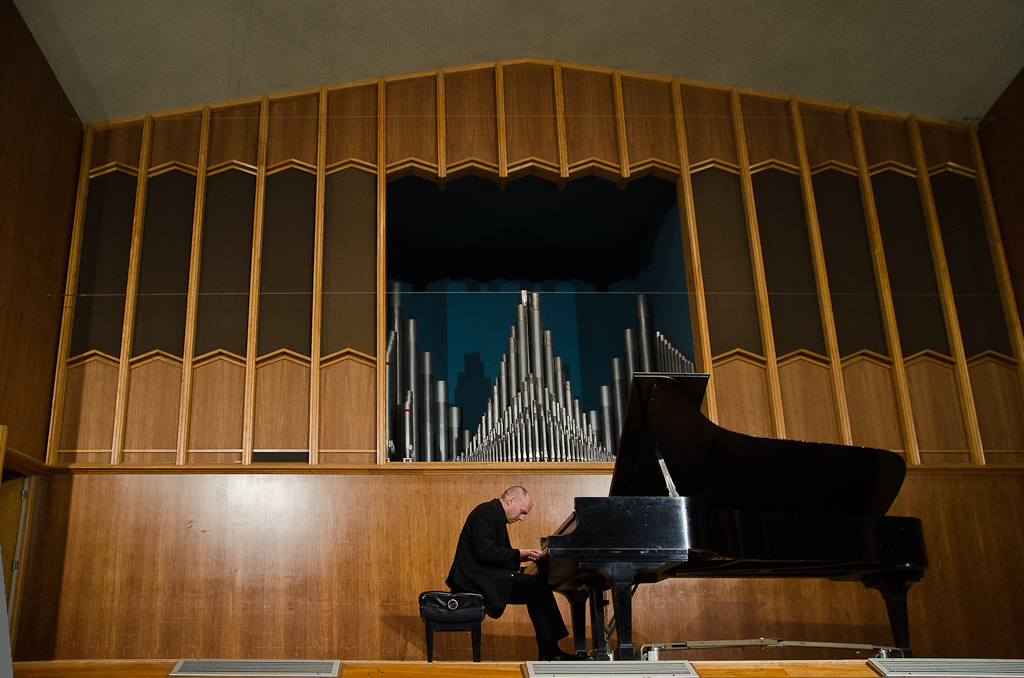
For the Year of the Arts, pianist Paul Barnes performed a musical tribute called “Retrospective on Philip Glass” on March 21, 2012. | Jessica Lindner/THE CHIMES
Biola’s Year of the Arts events are picking up as the halfway point of the semester approaches. On the evening of March 21, pianist Paul Barnes performed a musical tribute called “Retrospective on Philip Glass” in Crowell Hall, free of charge.
Students, faculty and members of the community attended the performance. Divided into three sections, the music came from a variety of Glass’ works, including orchestral pieces that were transcribed to be played on the piano. Following the performance, Barnes met with some students in the Collegium, answering questions and describing his experience working with Glass.
Barnes lectures, makes music relevant to non-music majors
This is not the first time Barnes has given a performance at Biola. Last year, Barnes performed an event called “Liszt and the Cross.” A post-performance lecture followed, which included commentary by Barnes regarding Liszt’s view of “the sacramental nature of music,” according to last year’s event description.
Sophomore Erin Whitlow attended that performance. She enjoyed the visual and oral interaction of instruction and performance, and said she thought Barnes gave compelling analysis of the music.
“People who aren’t music majors might get more out of it,” Whitlow said.
She describes Barnes as capable of making his analysis of music relevant to non-music majors and minors, enabling them to benefit from a piece without prior knowledge of music.
“You don’t have to be devoting your life to being an artist in order to appreciate art and take a lot from it,” said Whitlow, who came to Biola as a music major but is now undeclared, considering English or philosophy.
Various departments host events for Year of the Arts
According to Whitlow, the Year of the Arts events provide Whitlow with the opportunity to attend concerts and immerse herself in music even while she switches majors.
“Barnes’ Liszt sonata last year was incredible. I loved the way he explained the different musical motifs that traced back to theological concepts,” said Briana Ung, a sophomore piano performance major. “Seeing so much thought and expression in music has really helped to inspire me in my own work.”
Ung plans to attend the Symphony Orchestra Honors Concerto on April 21, as she particularly enjoys music. Both Whitlow and Ung are also excited for the upcoming Torrey Theater production of Tennessee Williams’ “The Glass Menagerie,” which is a departure from the usual Shakespeare play offered in the spring.
“It’s exciting because it’s a little bit different from what they’ve traditionally done,” Whitlow said.
In her opinion, departing from the typical show is a testament to the idea that the Year of the Arts is a time especially dedicated to new, exciting arts events.
Various clubs on campus, such as the Jewish Ministries Club, as well as departments such as the Torrey Honors Institute and the Biola Conservatory of Music, are working to sponsor these events.
Future events include tours of sacred spaces
The Year of the Arts brings talent from diverse areas — ranging from culinary arts to film to literature — and offers events almost every week until the semester’s end.
There will also be Year of the Arts tours of cathedrals, temples and other sacred spaces in Orange County and Los Angeles. Students pay $20, which includes lunch. Registration and payment for these can be made online.
Whitlow describes the increase in events as “bookending” the semesters — making more events available to students at times of the semester when they have more time to enjoy them.







